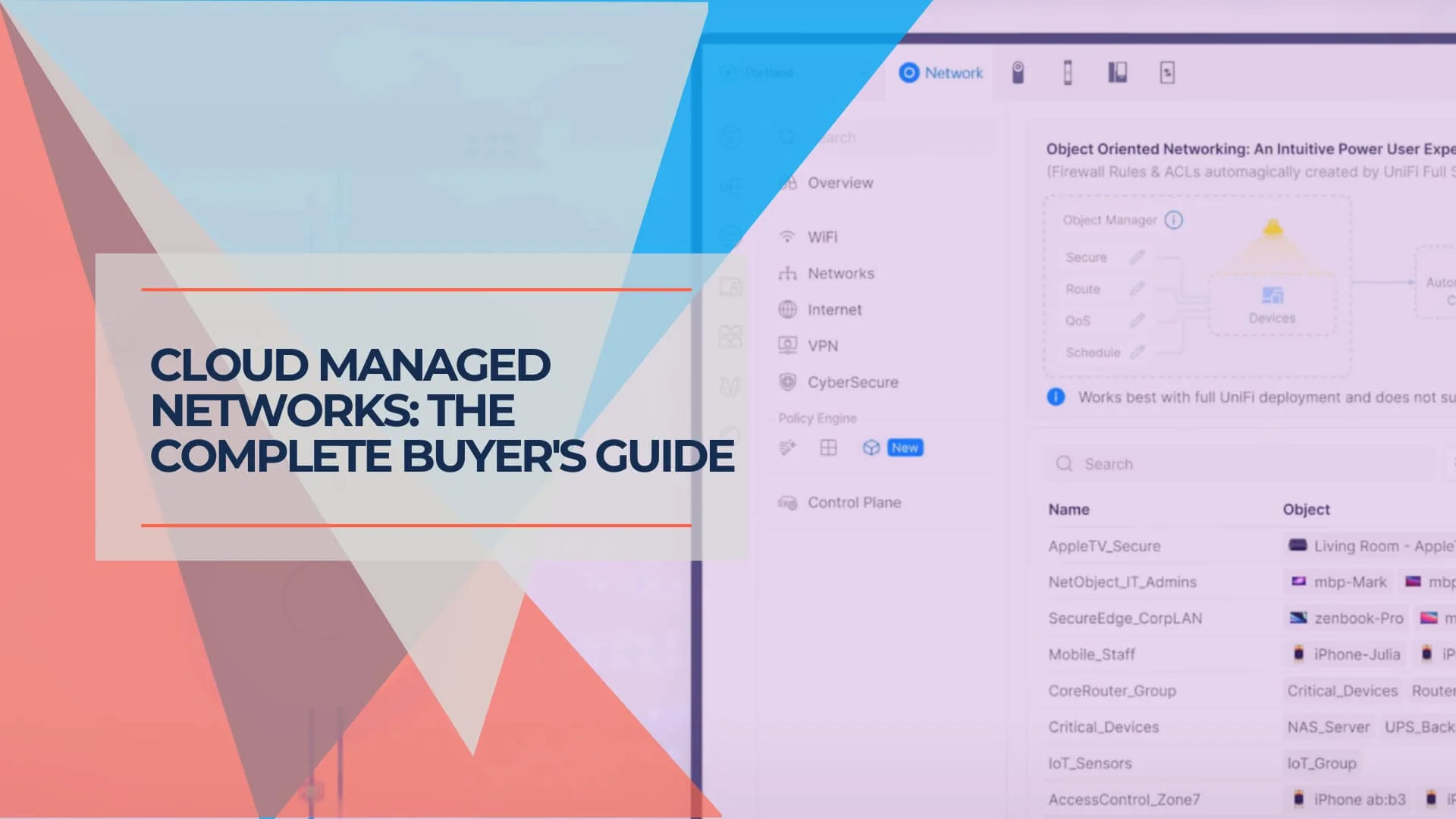Business Internet Requirements Calculator: How Much Speed Do You Actually Need?
Calculate your business internet requirements based on employees, video calls, and cloud apps. Get the right speed without overpaying.

Key Takeaway
Determining the right internet speed for your business depends on understanding how your team actually uses the connection. Video conferencing, cloud applications, and file transfers each have different bandwidth needs that add up quickly with multiple users. This guide walks you through a practical framework for calculating your requirements based on real usage patterns, helping you avoid both overpaying for unnecessary speed and suffering from insufficient bandwidth that hampers productivity.
Choosing the right business internet plan requires matching your bandwidth to your actual operations while building in capacity for growth. Through our network assessments with small businesses, we've found that many companies either overprovision their connections or unknowingly create bottlenecks with insufficient speeds.
Understanding Bandwidth Consumption by Application
Before calculating your total bandwidth requirements, you need to understand how much bandwidth your business activities actually consume. The numbers vary based on quality settings and the specific tools you're using.
Video Conferencing Bandwidth Needs
Video conferencing has become one of the primary bandwidth consumers for most businesses. According to official specifications from the major platforms, here's what different types of video calls require:
| Platform & Call Type | Download Speed | Upload Speed |
|---|---|---|
| Zoom 1-on-1 (HD 720p) | 1.2 Mbps | 1.2 Mbps |
| Zoom Group Call (HD 720p) | 2.6 Mbps | 1.8 Mbps |
| Zoom Group Call (Full HD 1080p) | 3.0 Mbps | 3.8 Mbps |
| Microsoft Teams 1-on-1 (HD) | 1.5 Mbps | 1.5 Mbps |
| Microsoft Teams Group (HD) | 2.5 Mbps | 2.5 Mbps |
| Google Meet (Full HD 1080p) | 3.2 Mbps | 3.2 Mbps |
Note: Hosting high-quality group calls often requires more upload speed than download (notice Zoom 1080p: 3.8 Mbps up vs 3.0 Mbps down)—a key reason why symmetric fiber connections outperform traditional cable for video-heavy businesses.
These requirements multiply quickly for businesses with multiple team members on separate video calls simultaneously. Three concurrent HD group calls could require 10-12 Mbps of upload bandwidth just for video conferencing.
Cloud Software and SaaS Applications
Modern businesses operate primarily in the cloud. Understanding how your essential business applications consume bandwidth helps you plan accurately. Our business tech stack guide covers the most common cloud platforms small businesses rely on.
Microsoft 365 and Google Workspace
These productivity suites require minimal bandwidth during typical use—email, document editing, and cloud file access typically consume 1-3 Mbps per active user. However, syncing large files or accessing cloud storage intensively can spike usage temporarily.
CRM and Business Applications
Systems like Salesforce, QuickBooks Online, and project management tools generally require 1-3 Mbps per concurrent user. These applications involve database queries and frequent updates that benefit from consistent connectivity rather than burst speed.
Remote Desktop and VDI
If employees connect to office computers remotely, bandwidth requirements increase. Standard remote desktop connections need 3-5 Mbps per session, while high-quality virtual desktop infrastructure implementations can require 10-15 Mbps per user.
File Transfer and Cloud Storage
The bandwidth required for file operations depends heavily on file sizes and how frequently your team accesses cloud storage. Document-based businesses have modest needs, while firms working with large design files, video, or CAD drawings require substantially more bandwidth—particularly for uploads.
Architecture firms, engineering companies, and creative agencies that work with large files need higher upload speeds than businesses that primarily deal with documents and spreadsheets. This becomes one of the key differentiators when evaluating your specific requirements.
Calculating Your Business Internet Requirements
Now that you understand per-application bandwidth consumption, you can calculate your actual requirements. This formula accounts for concurrent usage patterns rather than theoretical maximum load.
Step 1: Map Your Peak Usage Scenarios
Document what happens during your busiest hour. For most businesses, this occurs mid-morning or early afternoon when the whole team is active. Identify:
- Number of employees actively online
- Typical concurrent video calls
- Cloud applications in active use
- File transfer activities
- Any specialized applications (CAD, video rendering, etc.)
Step 2: Calculate Base Requirements
Use this framework to estimate your minimum bandwidth requirements:
| Business Type | Team Size | Usage Profile | Download Speed | Upload Speed |
|---|---|---|---|---|
| Light Office Use | 5-10 employees | Email, web browsing, cloud document editing, occasional video calls (1-2 concurrent calls) | 50-100 Mbps | 25-50 Mbps |
| Standard Office Operations | 10-20 employees | Regular video conferencing (3-4 concurrent calls), active cloud software use, moderate file sharing | 150-250 Mbps | 50-100 Mbps |
| Heavy Users | Any size | Large file transfers, video rendering, CAD work, extensive video conferencing, design/creative/technical work | 500+ Mbps | 250+ Mbps |
Note: Heavy users should prioritize upload speed and consider symmetric connections for optimal performance with large file operations.
Step 3: Account for Growth
Business internet upgrades often involve installation delays and sometimes construction costs. Plan for 12-18 months of growth rather than just current needs. If you plan to add employees or implement new cloud services, factor those changes into your bandwidth planning.
Planning Tip
Circuit installation timelines vary significantly by provider and location. Fiber installations can take 4-12 weeks, depending on whether the infrastructure has already reached your building. It's more efficient to slightly overprovision initially than to upgrade mid-contract when you realize you're bandwidth-constrained.
AI Traffic Consideration (2026)
As businesses adopt AI-powered tools like Microsoft Copilot, cloud-based AI processing, or local AI models with cloud sync, data consumption per user is trending upward. If your business is AI-heavy or planning to implement AI workflows, consider increasing your overhead buffer from 20% to 30% to accommodate these emerging workloads.
Business Bandwidth Calculator
Use our interactive calculator to estimate your bandwidth requirements based on your specific business usage patterns:
Recommended Speed
Based on your usage profile
Includes 20% overhead for peak usage and future growth. Consider fiber for best reliability.
We can help negotiate business internet rates
For a more detailed analysis including network cabling estimates, visit our full calculators page.
Why Low Ping Matters More Than High Speed
When evaluating internet connections, most businesses focus exclusively on bandwidth—how much data can flow through the pipe. However, latency (how fast that data travels) and jitter (consistency of that speed) often matter more for day-to-day operations than raw throughput numbers.
Understanding Latency vs Bandwidth
Think of bandwidth as the diameter of a water pipe, while latency is how quickly water reaches the faucet after you turn it on. A 1 Gbps connection with high latency and jitter will deliver a worse experience for video calls and real-time applications than a 50 Mbps connection with perfect stability.
Latency measures the time it takes for data to travel from your computer to a destination server and back, expressed in milliseconds (ms). Lower numbers are better. Jitter measures the variation in latency—how consistent your connection speed remains over time.
Real Business Impact
High latency and jitter create specific, noticeable problems:
Symptoms of Latency Issues
- Video calls freeze or have delayed audio. Participants experience the "talking over each other" problem because audio arrives late.
- VoIP phone calls sound choppy or garbled. Conversations become difficult when voice packets arrive out of order.
- Cloud software feels sluggish. Every click triggers a round-trip to the server. High latency makes cloud applications feel unresponsive.
- Remote desktop connections lag. Screen updates arrive slowly, making it frustrating to work on remote computers.
Connection Type Latency Benchmarks
Different connection technologies deliver vastly different latency characteristics:
| Connection Type | Typical Latency | Jitter | Business Suitability |
|---|---|---|---|
| Fiber Internet | 5-15 ms | Very Low | Excellent for all business applications |
| Cable Internet (DOCSIS 3.1+) | 15-30 ms | Low to Moderate | Good for most business use |
| Fixed Wireless / 5G | 30-50 ms | Moderate to High | Acceptable for basic use, problematic for real-time apps |
| LEO Satellite (Starlink Business) | 25-50 ms | Moderate | Viable for remote locations, good backup option |
| Legacy Satellite (Geostationary) | 500-700 ms | High | Not recommended for business operations |
How to Test and Monitor Latency
Speed tests show bandwidth, but you need specific tests for latency and jitter:
Testing Protocol
During Business Hours:
- Run ping tests to common business services (8.8.8.8 for Google DNS, your cloud software servers)
- Test continuously for 2-3 minutes, not just a single ping
- Look for both average latency and variation (jitter)
What to Look For:
- Ping should be consistently under 30ms for fiber, under 50ms for cable
- Jitter (variation between pings) should be under 10ms
- Packet loss should be 0% for business connections
Modern business networks benefit from monitoring latency continuously, not just during troubleshooting. If video call quality varies unpredictably, the issue is likely jitter rather than insufficient bandwidth.
When Latency Becomes the Deciding Factor
For certain business operations, latency matters more than bandwidth:
- Financial services or trading where milliseconds matter in transaction timing
- Architecture or engineering firms using cloud-based CAD or rendering where tool responsiveness is critical
- Healthcare practices conducting telehealth appointments where audio/video clarity is essential
- Call centers or customer service teams relying on VoIP phone systems
In these scenarios, choosing a lower-bandwidth fiber connection with 10ms latency will deliver better performance than a higher-bandwidth cable connection with 40ms latency and variable jitter.
Network Overhead: Why You Need More Than the Math Suggests
When calculating bandwidth requirements, the numbers from application specifications represent only the data your applications actively use. Your actual bandwidth needs are higher due to network protocol overhead and background processes.
The 20% Overhead Rule
Network protocols (TCP/IP), VPN encryption, and background operating system updates consume approximately 15-20% of your bandwidth before you even open a web browser. This overhead is unavoidable—it's how the internet works.
Always Add a 20% Buffer
When calculating your bandwidth requirements:
- Add up all your application needs (video calls, cloud software, file transfers)
- Multiply the total by 1.2 (20% buffer)
- Use this adjusted number as your minimum requirement
Example: If your calculations show you need 200 Mbps, plan for at least 240 Mbps to account for protocol overhead.
Understanding Bufferbloat
Bufferbloat is a particularly insidious problem that can make internet connections feel slow even when bandwidth is available. It occurs when large uploads saturate your connection, creating a queue of outgoing packets that delays time-sensitive traffic.
Real-World Scenario: An employee starts uploading a large file to Dropbox. This saturates your upload bandwidth. Meanwhile, another employee joins a Zoom call. Even though your download bandwidth is available, the Zoom call quality suffers because the video conferencing traffic gets stuck in the upload queue behind the file transfer.
This is why upload speed matters so critically for businesses—not just for sending large files quickly, but for ensuring that large file operations don't interfere with real-time communication tools.
Bufferbloat Warning Signs
- Video calls degrade specifically when large file uploads are happening
- Cloud backup processes make the internet feel slow for everyone
- Upload-intensive tasks interfere with seemingly unrelated applications
- Internet feels fast during speed tests but sluggish during actual work
Modern business routers can mitigate bufferbloat through Quality of Service (QoS) features that prioritize real-time traffic like video calls over bulk file transfers. However, the most effective solution is ensuring you have sufficient upload bandwidth that no single activity can saturate the connection.
Why Upload Speed Matters More Than You Think
Most internet marketing emphasizes download speeds while minimizing the importance of upload speeds. For modern cloud-based businesses, this creates a significant blind spot.
Upload-Intensive Business Activities
Traditional internet packages offer asymmetric speeds with much slower upload than download. A typical cable business internet plan might provide 300 Mbps download but only 25 Mbps upload. This worked when businesses primarily downloaded content, but modern operations have changed:
- Video conferencing sends video continuously. Your camera feed uploads to other participants throughout every call.
- Cloud backups require sustained upload bandwidth. Backing up substantial data on a slow upload connection can take hours or run overnight.
- Real-time collaboration means constant uploads. Every document edit, spreadsheet change, and file update is uploaded immediately to the cloud.
- Sending large files to clients or partners. Upload speed determines how quickly you can deliver completed work.
If you're evaluating internet providers in your area, our Miami business internet provider comparison covers the upload speed capabilities of different connection types and carriers available in South Florida.
When to Prioritize Upload Speed
Prioritize Upload When...
- Video conferencing is frequent. Multiple simultaneous calls require substantial upload bandwidth.
- Large files are part of daily operations. Design, video, and engineering firms need high upload speeds.
- Cloud backup is critical. Timely backups depend on upload capacity.
- Remote workers VPN to office resources. Each VPN connection consumes upload bandwidth from your office connection.
Testing Your Current Internet Performance
Before making upgrade decisions, test your internet performance during business operations. Running a speed test at 6 AM doesn't reflect real-world performance when your entire team is active.
How to Conduct Meaningful Speed Tests
Follow this testing protocol to understand your real bandwidth situation:
Test During Peak Hours
Run speed tests at 10 AM, 1 PM, and 3 PM when most employees are online and actively working. Document results from each test to identify patterns.
Test from Multiple Locations
Test from a computer connected via Ethernet cable to your router or switch, then test from WiFi-connected devices in different areas. Performance differences reveal whether your issue is internet bandwidth or internal network capacity.
Test Both Download and Upload
Most speed test tools show both metrics. Pay particular attention to upload speeds and compare them to your plan specifications.
Monitor Actual Application Performance
Beyond speed tests, document actual performance issues. Are video calls freezing? Do large file uploads take unusually long? Does cloud software feel sluggish during busy periods?
Understanding Your Results
Compare your test results to what you're paying for. Internet speeds typically deliver 80-95% of advertised rates during actual use. If you're consistently seeing significantly lower performance, common causes include:
- Network equipment limitations (router/switch capacity)
- WiFi congestion or coverage issues
- ISP network congestion in your area
- Outdated cabling infrastructure
If your network equipment is the bottleneck, upgrading to commercial-grade networking hardware can resolve performance issues without requiring a more expensive internet plan. Our comprehensive network setup guide covers building infrastructure that properly supports your business's internet connection.
Network Equipment That Supports Your Bandwidth
Your internet connection only delivers its rated performance if your equipment can handle it. A gigabit internet connection won't deliver gigabit speeds if your router can only process 300 Mbps, and even capable routers can become bottlenecks under heavy load.
Affiliate Disclosure
iFeelTech participates in the Ubiquiti Creator Program. We may earn a commission when you purchase UniFi products through our links at no additional cost to you. Our recommendations are based on professional experience and testing.
Gateway and Router Requirements
For business internet connections, your gateway or router needs sufficient processing power to handle your bandwidth, plus security features like firewall rules and VPN connections. Consumer routers often struggle with business workloads.
For businesses with connections up to 500 Mbps and 10-25 employees, we consistently recommend the UniFi Cloud Gateway Max as a reliable business-grade solution. It handles routing throughput that is appropriate for small to medium businesses and includes Dual-WAN failover capability—you can connect a backup internet connection to port 2 for automatic failover if your primary connection goes down. This level of redundancy used to be enterprise-only but is now accessible for small businesses.
For larger operations or businesses with gigabit connections, the UniFi Dream Machine Pro Max provides multi-gigabit routing capacity and advanced features like intrusion prevention without creating performance bottlenecks.
WiFi Access Points That Support Your Speed
Many businesses unknowingly limit their internet performance through inadequate WiFi coverage. Even with a 500 Mbps internet connection, WiFi dead zones or overloaded access points reduce effective speeds to a fraction of what you're paying for.
The current WiFi 6E and WiFi 7 access points provide significantly better performance in office environments than older standards. The UniFi U7 Pro offers WiFi 7 capabilities and can handle dozens of concurrent clients without performance degradation.
WiFi 7 Client Device Requirement
To benefit from WiFi 7 speeds, your client devices (laptops, phones, tablets) must also support WiFi 7. Older devices will connect successfully but fall back to WiFi 6/6E speeds. As of 2026, many new business laptops and smartphones include WiFi 7, but your existing devices may need upgrades to see the full performance benefits.
For comprehensive guidance on WiFi planning for business environments, our complete business WiFi range guide covers coverage planning and equipment selection in detail. For specific guidance on WiFi 7 access points, see our UniFi WiFi 7 guide.
When to Upgrade Your Business Internet Connection
Bandwidth requirements aren't static. Business operations evolve, teams grow, and new applications increase consumption over time. Recognizing the signs that you've outgrown your current connection helps you address issues before they impact productivity.
Clear Signs You Need More Bandwidth
Warning Signs
- Video calls regularly freeze or drop to low quality, particularly when multiple team members are on calls simultaneously.
- Cloud software feels sluggish during business hours, but works fine early morning or late afternoon.
- Large file uploads take unreasonably long, forcing you to plan around deadlines.
- Employees regularly complain about the internet speed. When performance becomes a recurring conversation topic, your bandwidth is insufficient.
- You're implementing new cloud services like video surveillance or cloud-based phone systems that increase bandwidth requirements.
Changes That Demand Immediate Upgrade Consideration
Critical Triggers
- Transitioning to cloud-based phone systems (VoIP). Voice quality demands consistent, reliable bandwidth.
- Implementing video security systems with cloud storage. Uploading video feeds continuously requires substantial upload bandwidth.
- Adding remote workers who use VPNs to access office resources. Each VPN connection consumes upload bandwidth.
- Moving local file servers to cloud storage. Initial sync can take days on insufficient upload speeds, and ongoing operation requires more bandwidth than local file access.
For businesses experiencing significant changes, our infrastructure investment guide explains how to balance current technology needs with future scalability.
Connection Type Comparison for Business Use
Not all internet connections are equal, even at the same advertised speeds. The underlying technology affects reliability, upload speeds, and overall performance for business use.
Fiber Internet
Key Advantages
- Symmetric speeds: Upload matches download, critical for cloud operations
- Consistent performance: Speeds don't degrade during peak usage times
- High reliability: Less susceptible to weather and interference
- Scalability: Easy to upgrade speeds without infrastructure changes
Best For: Any business with cloud-heavy operations, frequent video conferencing, or large file transfers. First choice when available in your area.
Cable Internet
Key Characteristics
- Wide availability: Available in most locations
- Fast download speeds: Often up to 1 Gbps download
- Asymmetric speeds (traditional): Upload typically much slower than download
- DOCSIS 4.0 (2026): Newer cable infrastructure offers symmetric or near-symmetric speeds in select markets
- Shared bandwidth: Performance can vary during neighborhood peak hours
- Jitter stability: Even with symmetric speeds, cable's shared medium can produce higher jitter than fiber
Best For: Businesses primarily download content, have limited video conferencing, or are located where fiber isn't available. Traditional cable's upload speed limitation is the primary consideration, though newer DOCSIS 4.0 deployments are beginning to address this gap in select markets. Note that fiber remains preferred for latency-sensitive applications due to superior jitter stability, even when cable matches the raw speed numbers.
Fixed Wireless and 5G Business Internet
Key Characteristics
- Quick deployment: No cable installation required
- Variable performance: Weather and congestion affect speeds
- Higher latency: Not ideal for real-time applications
- Data caps: Many plans include monthly usage limits
Best For: Temporary offices, remote locations, or backup connectivity. Generally not recommended as the primary business internet unless no wired options exist.
LEO Satellite Internet (Starlink Business)
Key Characteristics
- Remote accessibility: Available virtually anywhere, including rural areas without wired infrastructure
- Improved latency: 25-50ms latency (comparable to fixed wireless, far better than legacy satellite)
- No local infrastructure required: Self-contained dish installation
- Weather sensitivity: Performance can degrade during severe weather
- Moderate jitter: Higher variability than wired connections
Best For: Remote offices, construction sites, or backup connectivity where fiber and cable are unavailable. As of 2026, LEO satellite (particularly Starlink Business) has become a viable option for locations where traditional wired connections aren't feasible. Not recommended as primary connectivity when wired options exist, but significantly better than legacy geostationary satellite.
Cost Considerations and Decision Framework
Business internet represents a recurring operational expense that directly impacts productivity. When evaluating whether to upgrade your connection, consider both the direct and hidden costs of inadequate bandwidth.
Productivity Impact of Insufficient Bandwidth
The cost difference between adequate and inadequate bandwidth often pales in comparison to productivity losses from poor connectivity. If your team regularly experiences internet-related delays—waiting for files to upload, dealing with dropped video calls, or working around slow cloud software—those minutes accumulate quickly.
Professional service firms where time is directly billable face particularly clear calculations. When connectivity issues waste measurable time for employees with high billing rates, upgrading internet service quickly pays for itself through improved productivity.
When Premium Bandwidth Makes Sense
Invest in Better Bandwidth When...
- Your team's time is valuable and internet issues waste measurable productivity
- Client-facing operations depend on reliable video conferencing
- Large file operations are daily requirements rather than occasional needs
- You're planning growth over the next 12-18 months
- Fiber pricing is competitive with cable in your area (fiber's reliability and symmetric speeds often justify modest premiums)
Frequently Asked Questions
How much internet speed do I need for 10 employees?
A 10-person office typically needs 100-200 Mbps download and 50-75 Mbps upload for comfortable operation. This assumes standard business use, including cloud software, email, and 2-3 concurrent video calls. Creative or technical operations may require higher speeds, particularly for upload bandwidth.
Is business internet worth the extra cost over residential service?
Yes, for legitimate business operations. Business internet includes service level agreements, priority support, faster repair times, and often static IP addresses. The reliability difference becomes critical when internet downtime directly impacts revenue or client relationships.
How do I know if my internet speed or WiFi is the problem?
Test speeds using an Ethernet-connected device. If wired speeds match your plan but WiFi speeds are significantly slower, your issue is WiFi coverage or equipment capacity, not your internet connection. Upgrading the internet won't fix WiFi problems.
Why do speed tests show good speeds, but my internet still feels slow?
Speed tests measure burst capacity, not sustained performance under load. Business internet performance during actual operations depends on concurrent users, application types, and network equipment quality. A properly configured business network delivers more consistent real-world performance than speed test numbers alone might suggest.
Should I get symmetric internet speeds, or is asymmetric fine?
If your business regularly sends large files, uses video conferencing extensively, or backs up data to the cloud, symmetric speeds provide significant value. For businesses primarily consuming content rather than uploading it, asymmetric connections may be sufficient and typically cost less.
How long does it take to upgrade business internet?
Cable internet upgrades typically take 1-2 weeks from order to installation. Fiber internet installations can take 4-12 weeks, depending on whether fiber infrastructure already reaches your building. Plan accordingly rather than waiting until connectivity issues become critical.
Can I upgrade network equipment instead of getting faster internet?
Sometimes, upgrading routers, switches, and access points can resolve performance issues if your current internet plan provides adequate bandwidth, but your equipment creates bottlenecks. However, equipment upgrades won't overcome an insufficient internet connection if you're genuinely bandwidth-limited.
What's the difference between bandwidth and latency?
Bandwidth measures how much data can be transferred simultaneously, while latency measures how quickly data travels (the delay before the transfer begins). High bandwidth matters for large file transfers and multiple concurrent users, while low latency matters for real-time applications like video conferencing and VoIP calls.
Do I need a backup internet connection?
Businesses where internet downtime directly prevents operations or impacts revenue should consider backup connectivity. This could be a secondary connection from a different provider or a fixed wireless backup that activates if the primary connection fails. For businesses where brief internet outages are inconvenient but not critical, backup connectivity is optional.
How often should I reassess my bandwidth needs?
Review your business internet requirements annually or whenever you experience significant business changes, such as adding employees, implementing new cloud services, or moving offices. Don't wait until performance problems develop to evaluate whether your current connection still meets your needs.
Taking Action on Your Business Internet Requirements
Calculating your business internet requirements involves understanding how your team actually uses the connection, not just applying generic rules. The framework in this guide gives you realistic estimates based on actual business operations.
Start by testing your current performance during actual business hours. Document the results and compare them to your plan specifications. Your internet connection is performing normally if you're consistently receiving 80-95% of advertised speeds. If results fall significantly short, investigate whether the issue is your internet service, network equipment, or WiFi coverage.
For businesses planning office moves, expansions, or significant operational changes, research available internet providers and connection types in your target location early in the process. Fiber availability varies dramatically by location, and some areas offer limited business internet options that may influence your office selection decisions.
If you're in the Miami area and need professional guidance on business internet planning or network infrastructure, we provide comprehensive assessments that evaluate your current setup, document your requirements, and recommend specific solutions based on your operations and growth plans.
Schedule Your Comprehensive Network Analysis—We Test More Than Just SpeedOur network assessments include on-site speed testing, latency and jitter monitoring, equipment evaluation, bandwidth requirement calculations, and specific recommendations for internet service providers and network infrastructure improvements. We work with businesses throughout Miami-Dade and Broward counties to design network solutions that support current operations while building capacity for future growth.
Related Resources
- Miami Business Internet Guide – Provider comparison and recommendations
- Small Business Network Setup Guide – Complete networking infrastructure
- Wireless Range Extender Guide – WiFi coverage planning
- UniFi Business Network Guide – Professional networking equipment
Affiliate Disclosure: This article contains affiliate links. If you make a purchase through these links, we may earn a small commission at no extra cost to you.
Related Articles
More from Network Infrastructure

Business Network Cabling: Fiber vs Cat6A Complete Guide
Complete guide to choosing between fiber optic and Cat6A Ethernet cabling for business networks. Covers technical specifications, cost analysis, hybrid strategies, and UniFi equipment recommendations.
15 min read

Starlink Business vs Fiber Internet: Complete 2026 Business Comparison
Comprehensive comparison of Starlink Business vs AT&T Fiber and Comcast Business for Miami businesses. Real-world experience, pricing analysis, and recommendations.
23 min read

Best Centrally Managed Network Systems 2026: UniFi, Cisco Meraki, Aruba & More
Complete comparison of centrally managed network platforms for small business. Covers UniFi, Cisco Meraki, Aruba Instant On, TP-Link Omada, Zyxel Nebula, and Firewalla with cost analysis and recommendations.
22 min read
